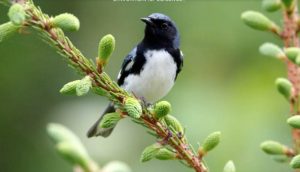As irrational as it is, the stronger the evidence gets that we are in the midst of a human-caused Mass Extinction, the more pressure there is to reduce existing protections of biodiversity

A male black-throated blue warbler, protected under the Migratory Birds Convention Act, perches above his female mate sitting on her eggs on the next. Is it too much for humans to consider the lives of wild things before we destroy their homes with little thought for their future or even of the sustainability of a healthy environment for ourselves? – Scott Leslie
Nova Scotia is not the only place where the Migratory Bird Convention Act (known in the U.S. as the Migratory Bird Treaty Act) has raised some hackles recently, both for and agin.
View: Defending The Migratory Bird Treaty Act And Clean Water: Our Conservation Science Director Testifies To Congress
By Winny Sun, June 18m 2019 for The CornellLab of Ornithology’s All About Birds. An extract:
Amanda Rodewald, senior director of conservation science at the Cornell Lab of Ornithology, was at the nation’s Capitol last week to defend two core conservation policies at risk of reinterpretation and weakening by the current presidential administration.
On Thursday June 13, Rodewald testified before the House Subcommittee on Water, Oceans, and Wildlife to speak against the Trump administration’s proposed reinterpretation of the Migratory Bird Treaty Act (MBTA). The treaty between the U.S. and Canada was ratified by Congress in 1918, and another version of the MBTA was signed between the U.S. and Mexico 20 years later. The act forbids both the purposeful and the incidental killing of a wide range of migratory birds. In December 2017, the Interior Department, under the Trump administration, issued a memorandum that sought to reinterpret the MBTA’s applicability in cases of incidental take.
“The exclusion of incidental take renders the [MBTA] impotent on most sources of mortality for migratory birds and eliminates a powerful incentive for industry,” Rodewald said at the House hearing.
Under the reinterpretation, companies that unintentionally kill birds (“incidental take”) would no longer be liable for the deaths they caused. In 2010, the Deepwater Horizon oil spill killed more than a million birds, for which the British oil company BP paid more than $100 million—funds that were used to restore damaged Gulf coastlines and bird habitat. But under this reinterpretation, companies like BP that kill birds due to negligence would no longer be subject to penalties.
“This proposed reinterpretation is inconsistent with previous administrations of Republicans and Democrats alike,” Rodewald said, noting that presidents from both parties have consistently used the incidental-take provisions of the MBTA as incentives for companies to reduce their harm to birds.
“I am not arguing that we should try to eliminate all human-caused mortality of birds,” Rodewald said. “But we can and should take active steps to reduce harm where possible, and the MBTA helps us to do that.”
As irrational as it seems, the stronger the evidence gets that we are in the midst of a human-caused Mass Extinction, the more pressure there is to reduce existing protections of biodiversity, as inadequate as they are.
So I have been heartened to see at least one rational response: Extinction Rebellion (XR) and XRNS

This female black-throated blue warbler sits on her nest. Will this be the last time she will raise a brood of four chicks at the Corbett Lake old growth forest? A 2013 scientific study estimated that up to 160,000 migratory bird nests are destroyed by logging in NS every year. With four chick average per nest, the number is even more staggering. – Scott Leslie
Some recent posts related to operation of the MBCA in NS
- Bev Wigney on proposed changes to the Canada Migratory Bird Regulations that would allow exceptions to the prohibition against disturbance of nests 24July2019
- “Re: Imminent violations of the Migratory Birds Convention Act in Shelburne County, NS” 23July2019
- Scott Leslie’s “backgrounder” video on the Corbett-Lake Old Growth Forest, Little Brown Bat added to SAR residents 17July 2019
- Annapolis Ecology Group seeks “Silent Summer Forestry” in Nova Scotia 28June2019
- Logging at Nova Scotia’s Corbett-Dalhousie Lakes Crown land NOT delayed, WestFor’s Marcus Zwicker: “it would be inevitable that nests are destroyed” 12Jun2019
